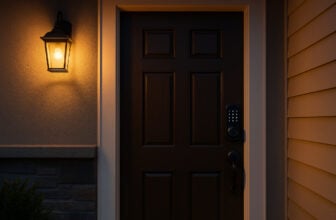Saving energy in a rental property is not only a step towards saving on utility bills; it’s the right thing to do that’s good for the environment and boosts tenant satisfaction. Whether you’re a landlord, tenant, or property manager, with a few tweaks, great things can occur.
Smart technology, clean energy, and these tips deliver real-world ways to maximize energy utilization in a rental property.
Invest in Smart Home Devices
Smart technology offers a straightforward path to improved energy management. Smart devices like programmable thermostats, motion-sensor lights, and smart plugs allow the tenants or managers to manage usage with precision.
An intelligent thermostat, for example, can modify heating and cooling schedules based on occupancy levels, eliminating wasteful energy use when the structure is vacant. Automated lighting controls also ensure that lights are not left on in empty rooms.
These systems can often be accessed and manipulated through cell-based apps, which provide remote access and more control. A relatively small investment in these devices usually results in notable savings in overall energy costs.
Consider Renewable Energy Sources
Installing renewable energy systems is no longer limited to permanent residences—rental residences can get a break too. Solar panels, for instance, are cheaper and less invasive than ever before, with choices for roof or portable mounts that don’t bother the structure much.
Landlords can consider community solar plans or leases to offset installation expenses. Small wind or hydro solutions can even work in some locations. Renewable systems not only save utility expenses in the long term but also increase property value to eco-conscious tenants. They are a long-term solution for green energy consumption, decreasing dependence on conventional power lines.
Maintain a Safe and Efficient Electrical System
The secret to any energy-efficient building is the well-being of its electrical system. Frayed wiring, saturated circuits, and unused outlets can not only increase electricity consumption but also pose a hazard.
Periodic inspections determine where power could be wasted or where upgrades would reduce consumption. For instance, older circuit breakers could not handle the loads that today’s appliances can.
It’s essential to hire experienced electricians to evaluate and, if necessary, modernize the system. Optimizing the electrical system makes it possible to improve safety and energy performance without guesswork or band-aids.
Seal Leaks and Improve Insulation
Leaks and poor insulation will render even the most efficient system ineffective. Leaking windows, unsealed doors, and thin wall insulation make heating and cooling systems work harder than they should.
Installation of weather stripping, insulating curtains, and double-glazed windows is an effective way to minimize temperature loss. Refurbishments to insulation do not have to involve huge renovations; even small repairs like foam sealant or filling insulation panels in attics can significantly enhance energy retention.
These enhancements all translate directly to reduced energy consumption by maintaining the indoor climate more stable, regardless of outdoor temperatures.
Promote Tenant Awareness and Engagement
Tenant behavior has a significant impact on energy consumption. Encouraging efficient use through warm encouragement could lead to long-term savings. Posting reminder notices to switch off unused appliances, adjusting moderate thermostat settings, or reporting maintenance issues promptly fosters a culture of frugality.
Providing energy-saving tips in welcome packets or newsletters can be effective, too. Landlords can also reward tenants who become energy-conscious by installing energy-efficient appliances or reducing their monthly consumption. Equipping tenants with the ability to engage in conservation efforts bridges the gap between infrastructure provision and utilization.
In conclusion, reducing energy use in rental properties takes a mix of proper maintenance, prudent investment, and tenant cooperation. Through proper maintenance of an electrically sound system, use of smart technologies, a focus on renewables, leak avoidance, and tenant support, tenants and landlords alike can save on their bills and contribute to a greener tomorrow. Going efficient with energy doesn’t equate to huge upgrades; it equates to making good, smart choices.





